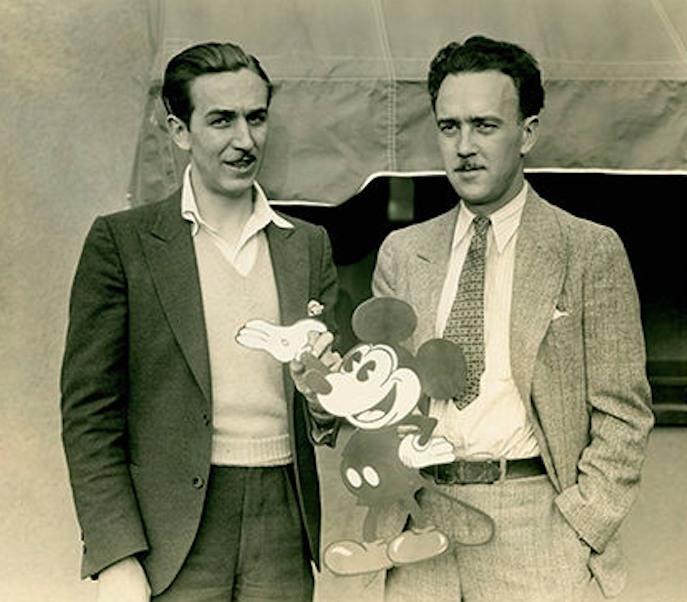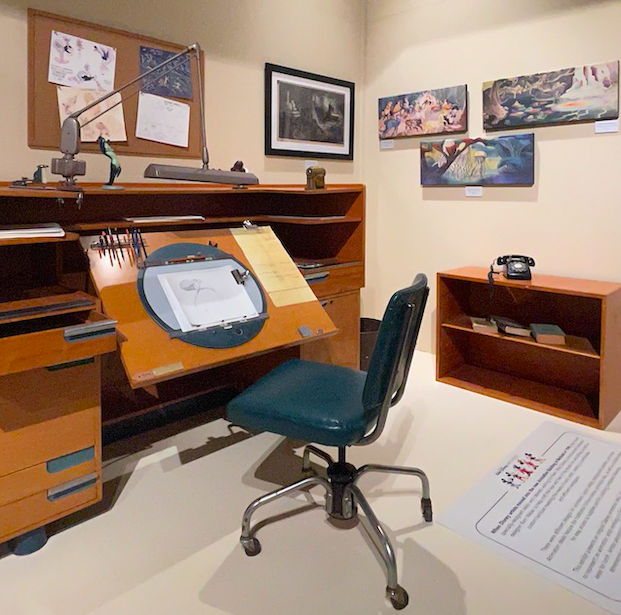
5
Dec
In Memory: Walt Disney
On this day in 1901, the legend of animation, one and only Walter Elias Disney was born in Chicago, Illinois.
When he was four, his family moved to a farm in Marceline, a small town in Missouri, where Walt spent most of his childhood together with his parents Elias and Flora Disney, his three brothers: Herbert, Raymond, and Roy, and sister Ruth. He began to draw and paint during his early childhood while still in Marceline, copying the front-page cartoons of Ryan Walker from The Appeal to Reason newspaper.

In 1911, Walt and his family moved to Kansas City, where he and his brother Roy woke up at 4:30 every morning to deliver the Kansas City Times before and The Kansas City Star after school. Walt continued doing this job for more than six years although it exhausted him.

In mid-1918, young Walt Disney attempted to join the United States Army to fight the Germans in WWI but he was rejected because of his age. He forged the date of birth on his birth certificate and managed to join the Red Cross in September 1918 as an ambulance driver. He was shipped to France, where he arrived in November. In October 1919, he came back home.

Walt became interested in animation, so with the assistance of a book on animation and a camera, he began experimenting at home. In May 1921, at the age of 20, he started a company, Laugh-O-Gram Studio, which went into bankruptcy in July 1923 and 21-year-old Walt Disney moved to Hollywood with just 40 USD cash in his pocket. Soon Walt and Roy launched the Disney Brothers Studio, which later transformed into the Walt Disney Company. Early in 1925, Walt hired an ink artist, Lillian Bounds, whom he married on 13 July of that year.

"All our dreams can come true if we have the courage to pursue them", he said and proved himself the reality of such a possibility. His brother, Roy O. Disney was Walt's partner in creating the magic. Walt's career took off with the creation of the iconic character Mickey Mouse in May 1928. Walt Disney provided Mickey's voice until 1947 in over 100 short films, giving "him his soul".

Disney had a nervous breakdown in October 1931, which he blamed on the machinations of Powers and his own overwork. To recover, he took a holiday to Cuba and a cruise to Panama together with his wife Lillian.

Walt Disney introduced synchronized sound, full-color three-strip Technicolor, feature-length cartoons, and technical developments in cameras. He set the era of animation with his first full length animated feature "Snow White and the Seven Dwarfs", which premiered in December 1937. Walt won an Honorary Academy Award, which consisted of one full-sized and seven miniature Oscar statuettes.

Walt Disney holds the Guinness Book of World Records record for winning the most Oscars: He was nominated 59 times and won 22 times. He also has four honorary Oscars, three Golden Globe awards, and one Emmy. In the 1960s, President Lyndon Johnson presented Walt Disney with the Presidential Medal of Freedom, the highest civil honour in the United States.

In October 1941, the United States entered World War II. Walt Disney produced short Donald Duck cartoons to promote war bonds and several propaganda productions, such as "Der Fuehrer's Face"—which won an Academy Award—and the 1943 feature film "Victory Through Air Power". The military films generated revenue hardly enough to cover the company costs. The feature film "Bambi" underperformed on its release in April 1942 and lost $200,000 at the box office. Additionally, there were low earnings from "Pinocchio" and "Fantasia". In 1944, the Disney company had debts of $4 million with the Bank of America.

In March 1952, Walt received zoning permission to build a theme park in Burbank, near the Disney studios but the site proved too small, and a larger plot in Anaheim, 56 km (35 miles) south of the studio, was purchased. There he created Disneyland, based purely on his imagination. On 17 July 1955, the opening ceremony was broadcast on ABC, which reached 70 million viewers. Walt Disney also created television programs such as “The Mickey Mouse Club”.

Early in November 1966, Walt Disney – a heavy smoker since WWI – was diagnosed with lung cancer and doctors treated him with cobalt therapy. On 30 November, he felt unwell and an ambulance took him to St Joseph Hospital. The world lost this genius on 15 December 1966. Two days later his remains were cremated and laid to rest at the Forest Lawn Memorial Park in Glendale, California, while his legacy remains and grows up to these days.

After Walt Disney's death, his studios continued to produce live-action films but largely abandoned animation until the late 1980s. The new beginning launched with "The Little Mermaid" in 1989, was described as the "Disney Renaissance" by The New York Times. Today Disney's companies continue to produce the successful film, television and stage entertainment

Walt Disney and Lillian Bounds had two daughters, Diane born in December 1933 and Sharon adopted in December 1936. In 2009, Diane Disney and her son Walter E. D. Miller opened the Walt Disney Family Museum in the Presidio of San Francisco.
BRAMS Institute honours the memory of an iconic figure in animation’s history and therefore, wishes a happy 120th birthday to Walt Disney and all his fans!

The Skeleton Dance (1929)
Mother Goose Melodies (1931)
The Moose Hunt (1931)
The China Plate (1931)
Egyptian Melodies (1931)
Mickey in Arabia (1932)
Three Little Pigs (1933)
Mickey's Pal Pluto (1933)
The Pied Piper (1933)
The Night Before Christmas (1933)
On Ice (1935) Minnie Mouse
The Tortoise and the Hare (1935)
Thru The Mirror (1936) Mickey Mouse
Mickey's Grand Opera (1936)
Elmer Elephant (1936)
Donald and Pluto (1936)
Three Blind Mouseketeers (1936)
Snow White and the Seven Dwarfs (1937)
Don Donald (1937)
Little Hiawatha (1937)
Mickey's Parrot (1938)
Brave Little Tailor (1938)
Ferdinand the Bull (1938)
Donald's Cousin Gus (1939)
Pinocchio (1940)
Fantasia (1940)
Mr Mouse Takes a Trip (1940)
Mr Duck Steps Out (1940) Huey, Dewey, and Louie
Dumbo (1941)
The Art of Skiing (1941) Goofy
The Little Whirlwind (1941)
Bambi (1942)
Sky Trooper (1942)
Der Fuehrer's Face (1942)
Mickey's Birthday Party (1942) Clara Cluck
Private Pluto (1943)
Fall Out Fall In (1943)
Figaro and Cleo (1943)
Commando Duck (1944)
Tiger Trouble (1945)
African Diary (1945)
Donald's Crime (1945)
Canine Casanova (1945)
Duck Pimples (1945)
The Legend of Coyote Rock (1945)
Cured Duck (1945)
Old Sequoia (1945)
A Knight for a Day (1946)
Pluto's Kid Brother (1946)
Squatter's Rights (1946)
Donald's Double Trouble (1946)
Wet Paint (1946)
The Whale Who Wanted to Sing at the Met (1946)
Clown of the Jungle (1947)
Donald's Dilemma (1947)
Figaro and Frankie (1947)
Chip an' Dale (1947)
Pluto's Purchase (1948) Butch the Bulldog
Toy Tinkers (1949) Chip and Dale
Pluto's Sweater (1949)
Crazy Over Daisy (1950)
Morris the Midget Moose (1950)
Alice in Wanderland (1951)
Out of Scale (1951)
The Little House (1952)
Peter Pan (1953)
Lady and the Tramp (1955)
Zorro (1957); The Sign of Zorro (1958); Zorro, the Avenger (1959)
Sleeping Beauty (1959)
One Hundred and One Dalmatians (1961)
The Legend of Lobo (1962)
In Search of the Castaways (1962)
The Sword in the Stone (1963)
Mary Poppins (1964)
The Legend of Young Dick Turpin (1965)
The Jungle Book (1967)
Donald Duck and others (mix of cartoons)
